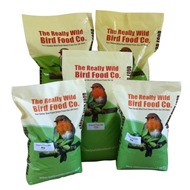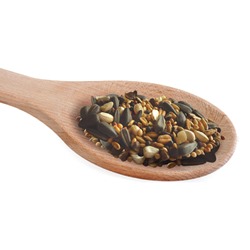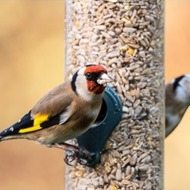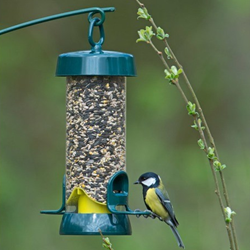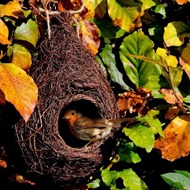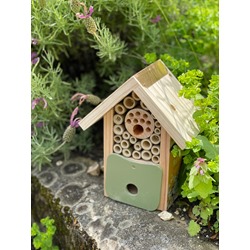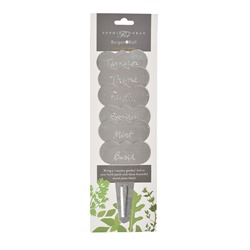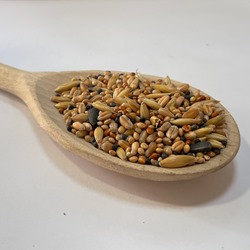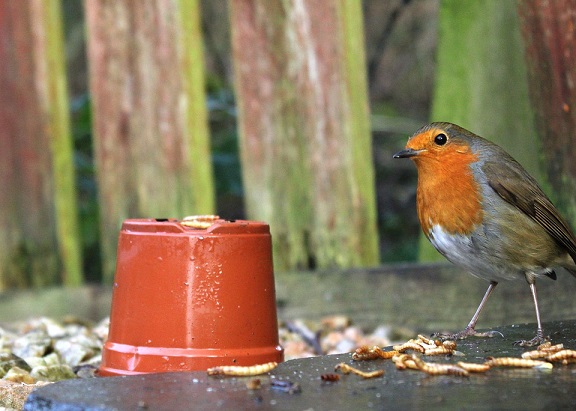
Feeding live bird food to your garden visitors can be a bit intimidating - but it's easier than you think! Read our live bird food tips to get started.
Live bird food usually consists of insects and bugs, and is an alternative to the usual seeds and nuts that tend to fill garden feeders. In nature, insects are a significant part of the diets of many different birds. Hence, the classic image of the early bird getting the worm! Live bird food tends to be a good source of protein for our feathered friends, particularly mealworms.
We know that not everyone is keen to order a bunch of wriggling worms to their house (we do offer dried mealworms as an alternative) but the benefits to your local birds can be worth the discomfort. For some tips and advice on handling live bird food, as well as why you should give it a go, read on!
Why Feed Birds Live Bird Food?
Insectivorous birds (birds who eat insects) are at risk when they don't have access to enough food, and insect populations are in decline in the UK. The lack of mature, native trees in our gardens and ever-decreasing areas of natural woodland means that wild birds cannot find the live bird food they need to feed their young. This means fewer eggs, and fewer fledglings. Help these birds by providing live bird food, particularly during periods of colder weather and breeding periods.
Live bird food like mealworms can be easily digestible with a high moisture content - essential for fledglings who cannot leave the nest to drink. It has been proven that live bird food can have a significant positive effect on the number of chicks reared by their parents. Wax worms and mealworms are also rich in essential protein (50.4%) and much easier to store and use than you might think.
Buy Live Mealworms & Wax Worms for Birds >
Storing Live Bird Food
When you order live bird food, it will either arrive in a tub or a bag. Check below for storage instructions for each option.
Live Bird Food Tub
Before your ready to feed the birds, you'll need to store your live bird food. It's actually pretty simple! If the wax worms come supplied in a tub (like many of ours do) then the lid should be either breathable or ventilated. They will usually arrive with some bran inside the tub to keep them going, so you can just keep them cool until you're ready to use them. The ideal storage temperature is 8 to 10 °C.
They do not need light - in fact, dark is good - and if you notice their food has depleted, you can add a bit of carrot, apple, oats or potato peelings. Wax worms and mealworms can be kept this way for several months at the correct temperature.
Live Bird Food Bag
Bulk bags of live worms are more economical but need to be unpacked on arrival. They can be stored in a large open plastic container such as a cat litter tray or similar, at a maximum depth of 1 inch. There is no need for a lid as long as the sides are deep and clean and the container is placed somewhere where it won't be knocked over!
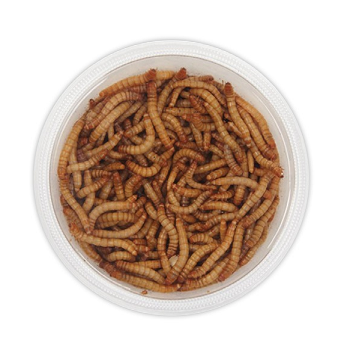
Feeding Birds Live Bird Food
Live bird food like mealworms should be contained in a smooth steep-sided container, even when you are ready for the birds to eat them. Otherwise, you may find that they wriggle up and out - nobody wants that. ideally something with a roof or overhang to protect them from the rain and sun, and drainage holes if there is no roof. Windows feeders lend themselves to mealworms, and it's fab to get a really close-up view of your robin and other smalls birds visiting. Caged feeders are also useful since they limit access to the bigger birds which can devour a whole pot in an instant!
If you are concerned about choosing the wrong bird feeder, then check the product descriptions for feeders here at Really Wild Bird Food! We will usually specify if a bird feeder is suitable for live bird food. For example, this beautiful sunflower bird feeder is suitable for mealworms. We even have an entire page dedicated to mealworm feeders!
Shop Mealworm Feeders
Live Bird Food Tips - FAQs
For more live bird food tips, read the below FAQs!
Which birds eat live worms?
Insect and invertebrate eaters who eat live worms include robins, sparrows, tits, starlings, blackbirds, wrens and thrushes.
What are mealworms?
They are the larvae of the flour beetle (Tenebrio Molitor), a native British insect that eats flour, meal, grain and other related crops. They are vegetarian, which is important because when fresh, they don't smell!
Where do your live mealworms come from?
Our live mealworms are grown in the UK for us and are British bred! There are many companies importing mealworms from Europe; ours will be fresher as they won't have travelled far.
If I order live worms, what can I expect to receive?
Live mealworms are delivered by Royal Mail. They will arrive in a cardboard box, and within the box will be either some plastic tubs or larger quantities within a white polypropylene bag with a cable-tied top. Please don't worry if the plastic tubs don't have air holes punched in them - the lids are made of breathable material so the mealworms will be fine.
Can live bird food go in the fridge?
Wax worms and mealworms can go in the fridge, but this can make them a bit dormant and less wriggly - and it's the wriggling that attracts the bird's keen eye. Temperatures below 5 °C will kill the mealworms and wax worms, while temperatures above 22 degrees will make them pupate very quickly.
Do the mealworms smell?
No! There is no smell given off by mealworms or wax worms if they are kept in the correct conditions. There will be some bran or clean newspaper in with them when they arrive. For those that are in tubs, you don't need to do anything. If you have bought a larger sack of them, we would suggest transferring them into a shallow, smooth-sided tray or tub.
How long will the worms last?
Being larvae, their longevity is dependent on the conditions and temperature they are stored at. The cooler they are, the longer they will last. If you find that there is a lot of black poo appearing, the chances are it is too warm for them or they are too deep in their container.
If I order them today, when will I receive them?
All live foods are sent by Royal Mail. They, therefore, take 3-5 working days and will arrive separately from the rest of your Really Wild Bird Food order (which should arrive on the next working day). Orders received before 12.00 on Monday to Thursday will be dispatched on the same day. Orders received on a Friday to Sunday will be dispatched on the following Monday. We are ultra-careful around bank holidays (especially during the warm summer months) in case they get held up in a warm sorting office somewhere, speeding up their metamorphosis. Please order a few days earlier around a bank holiday.
I would like to receive a regular weekly order - can you do this?
Of course! We have many customers who request scheduled live mealworm deliveries, either on a weekly, fortnightly or monthly basis. Please contact us with your request.
Would you like to purchase some live or dried mealworms for your feathered friends? Here at Really Wild Bird Food, we offer a variety of mealworms and wax worms for you to choose from! Click the button below to start shopping.
Live wax worms and live/dried mealworms for birds
 Back
Back Bird Foods
Bird Foods
 Seed Mixes
Seed Mixes Straight Seeds
Straight Seeds Mealworms & Worms
Mealworms & Worms Chicken Feed
Chicken Feed Duck Food
Duck Food Peanuts & Peanut Butter
Peanuts & Peanut Butter Suet & Fat Balls
Suet & Fat Balls No Mess Bird Seed
No Mess Bird Seed Wheat Free Bird Seed
Wheat Free Bird Seed Sunflower Seeds
Sunflower Seeds Softbill Bird Food
Softbill Bird Food Bulk Bird Seed
Bulk Bird Seed Trial Packs
Trial Packs Pick & Mix
Pick & Mix Mini Pick & Mix
Mini Pick & Mix Birdie Basics: Budget Bird Food
Birdie Basics: Budget Bird Food Food for Small Birds
Food for Small Birds Back
Back Bird Feeders
Bird Feeders
 Seed Feeders
Seed Feeders Peanut Feeders
Peanut Feeders Peanut Butter Feeders
Peanut Butter Feeders Suet & Fat Feeders
Suet & Fat Feeders Window Feeders
Window Feeders Hanging Feeders
Hanging Feeders Feeding Stations
Feeding Stations Ground Feeders
Ground Feeders Easy Clean Feeders
Easy Clean Feeders Bird Tables
Bird Tables Seed Trays
Seed Trays Bird Baths & Drinkers
Bird Baths & Drinkers Feeder Accessories
Feeder Accessories Feeder Hygiene
Feeder Hygiene Squirrel Proof Bird Feeders
Squirrel Proof Bird Feeders For the Kids
For the Kids Niger Seed Feeders
Niger Seed Feeders Mealworm Feeders
Mealworm Feeders Bird Food Storage
Bird Food Storage Fat Ball Feeders
Fat Ball Feeders Tube Feeders
Tube Feeders



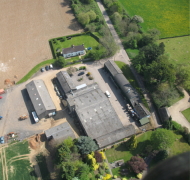 Our Farm
Our Farm
 Tips & Advice
Tips & Advice
Contact Us

